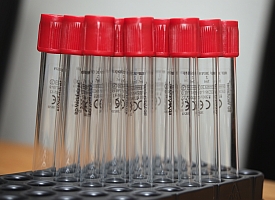 A survey and focus groups on public attitudes toward informed consent for participation in collections of tissue samples, show a preference for giving consent in advance, balanced with convenience for the contributors. The findings from researchers at the University of Iowa College of Medicine appear in the online issue of the journal Genetics in Medicine (paid subscription required).
A survey and focus groups on public attitudes toward informed consent for participation in collections of tissue samples, show a preference for giving consent in advance, balanced with convenience for the contributors. The findings from researchers at the University of Iowa College of Medicine appear in the online issue of the journal Genetics in Medicine (paid subscription required).
The study explored Americans’ preference for informed consent, when contributing tissue samples to biobanks — collections of tissue samples from surgeries, as well as blood or saliva specimens. Biobanks collect these samples for future research, including genetic research, and may be linked to personal health information about the donor.
The study included a survey of 751 Americans contacted by telephone, supplemented by seven focus groups of Iowans; half of the study participants were women. Most participants had not heard of the term “biobank” before the study, but when their purpose was explained, most study participants supported the idea of biobanks.
Despite this general level of support for biobanks, nearly all survey respondents (95%) rejected the idea of taking and collecting samples without first informing and asking patients for their permission, i.e., obtaining informed consent. Other results of the study showed:
– Two-thirds (67%) of those surveyed and nearly as many 63%) of those who participated in the focus groups said they would prefer an opt-in consent process.
– Almost two in 20 survey respondents (18%) said they would prefer an opt-out process, as did a quarter (25%) of the focus groups.
– When asked to consider if they preferred a broad description of how their samples and health information might be used in future research, or whether they wanted to control what research their samples and health information are used, four in 10 survey respondents (41%) and about half (54%) of the focus groups favored the broad approach to providing consent.
The examples of greater control options included menu-type consent forms, and requests to be contacted for permission every time their samples and health information became eligible for research.
Bioethicist Christian Simon who led the study says “an informed consent process that meets formal requirements and standards and that works for people by taking their values and preferences into account is one way that we can reach out and build public support and trust for biobanks.”
Read more: Consumers Want, Will Pay for Predictive Health Tests
Photo: Håkan Dahlström/Flickr
* * *

 RSS - Posts
RSS - Posts
You must be logged in to post a comment.